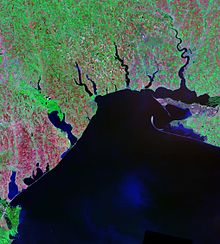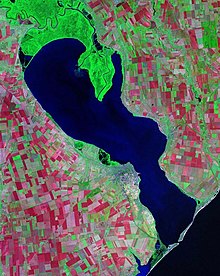


A liman (Russian: лиман; Romanian: liman) is an enlarged estuary formed as a lagoon at the wide mouth of one or several rivers, where flow is nearly fully or partially constrained by a mouth bar of sediments (peresyp), as in the Dniester Liman or the Razelm liman. A liman can be maritime (the bar being created by the current of a sea) or fluvial (the bar being created by the slowed or turned flow of a sediment-saturated river). The term describes many wet estuaries in the Black Sea and the Sea of Azov; a synonymous term guba (губа) is used in Russian sources for estuaries of the Russian shores in the north.
Water in a liman is brackish with a variable salinity: during periods of low fresh-water intake, wide-mouthed, deep examples will be greatly saline from inflow of sea water and evaporation.
Such features are found in places with low tidal range, for example along the western and northern coast of the Black Sea, in the Baltic Sea (Vistula Lagoon, the Curonian Lagoon), as well as along the lowest part of the Danube. Examples of limans include Lake Varna in Bulgaria, Lake Razelm in Romania, the Dniester Liman in Ukraine and the Anadyrskiy Liman and Amur Liman in Siberia.
Etymology
English borrows the word from Russian: лиман, romanized: liman (Russian pronunciation: [lʲɪˈman]), taken from the Turkish: liman spread by Turks when they occupied the western and northern shore of the Black Sea. Liman originated in the Greek: λιμήν/λιμάν, romanized: limin/liman (meaning bay or port). The term large natural harbour is frequently synonymous.
Locations
Europe
- Turkey: Lake Büyükçekmece, Lake Küçükçekmece.
See also
References
- (in Romanian) Mihai Ielenicz (ed., 1999): Dicționar de geografie fizică, Corint publ., Bucharest, 1999 ; Grigore Antipa (1941) : Marea Neagră, Romanian academy press, Bucharest, 1941, pp. 55-64, and Petre Gâștescu, Vasile Sencu (1968) : Împărăția limanelor, Meridiane publ., Bucharest.
- "лимáн" Vasmer's Etymological Dictionary in Russian